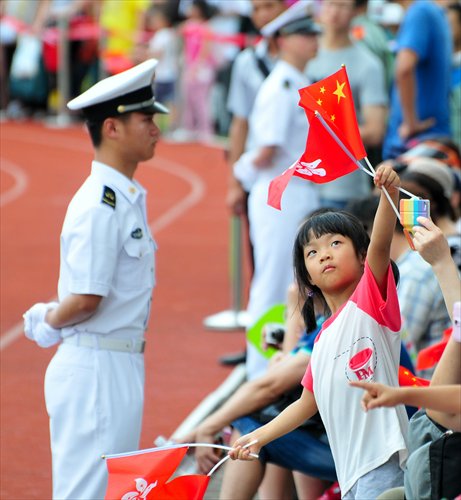HOME >> CHINA
Central concerns
By Cathy Wong Source:Global Times Published: 2014-9-28 19:48:02
Stability of trade, tourism under threat as tensions simmer in Hong Kong

A young Hong Kong girl holds the flags of the People's Republic of China and the Hong Kong Special Administrative Region on July 1, the 17th anniversary of the return of Hong Kong to the Chinese mainland. Photo: CFP
"Horses will keep racing, and nightclub goers will continue dancing," said the then leader Deng Xiaoping before the handover of Hong Kong.
The metaphor for Hong Kong's unchanged spirit and lifestyle after the 1997 handover is a vivid expression for the "one country, two systems," a constitutional principal put forward by Deng. It promises that distinct Chinese regions like Hong Kong and Macao could retain their existing capitalist economic and political systems and high degree of autonomy after its reunification with the mainland.
Seventeen years later, President Xi Jinping also reiterated the need to uphold "one country, two systems" and stressed it will not change.
Occupy Central officially commenced Sunday as its organizer Benny Tai Yiu-ting declared in an announcement that the campaign would start with occupying the government headquarters following a week of school strikes. The activists demand for "genuine" democracy after a legal framework was released in August by the Standing Committee of the National People's Congress (NPC), China's top legislature, on ways to select Hong Kong's top leader.
It is the city's heated political situation that has caused concern among its political and business leaders over the future of the policy.
Business not as usual
Closer business ties with the mainland since the handover have become one major pillar of Hong Kong's economy. However, the Occupy Central movement has not only harmed political stability in Hong Kong, but also has shaken investor confidence.
"There has not been any difference in business environment or policy since the handover, [in particular,] the tax structure has remained the same," said Vijay Sheth, representative of Sarjan Group, an Indian chamber of commerce in Hong Kong representing more than 250 diamond dealers.
Besides the attractive duty structure, according to Sheth, its free trade policy and accessible location have helped Hong Kong remain competitive since its handover.
But as Occupy Central activists continue to escalate their protests in Hong Kong, luxury business leaders like Sheth are worried about their development in the city.
"Safety and security is our main concern. If Occupy Central really happens, we may lose our customers from both overseas and the mainland," he said.
Sheth is echoed by Regina Ip Lau Suk-yee, a Hong Kong legislator.
"[Occupy Central] has already done a lot of damage to our image overseas and in the mainland because this has projected an image of uncertainty and turbulence."
"Some foreign businessmen and chambers have told me that some investors are rethinking their investment in Hong Kong because of the perception of uncertainty and turbulence," Ip said.
Tourism, an important pillar of Hong Kong's economy, may also suffer due to the region's political tensions, say experts.
The introduction of the Individual Visit Scheme (IVS) has brought a major increase in mainland visitors to Hong Kong, reports said.
According to Hong Kong government statistics, in 2002, before the launch of the IVS, there were about 6.8 million mainlanders visiting Hong Kong. In 2012, that number rose to 34.91 million, among which 66 percent (about 23.14 million) were IVS visitors.
"Visitors from the Chinese mainland have been one of our major sources of income and have contributed greatly to our local economy," said Tung Yiu-chung, chairman of Tourism Industry Council Hong Kong
"Occupy Central will threaten Hong Kong's tourism industry, in particular that most business travelers have to live and conduct business in Central."
"There have already been tourists from European and South East Asian countries inquiring about the political situation in Hong Kong. Some are even reconsidering their trip because of it," he said.
Theory of evolution
A white paper on the "one country, two systems" policy, published in June by the central government, has drawn strong reactions in Hong Kong amid suspicion of a shift in policy regarding the region's autonomy. The paper reaffirmed the central government's "overall jurisdiction" over Hong Kong.
"The 'one country, two systems' is a work in progress that continues to evolve. Unfortunately, there have been people in Hong Kong who want to equate a high degree of autonomy with complete autonomy, or even self-rule, which lies outside the concept of 'one country, two systems,'" Ip said.
Ip, who was also Hong Kong's former Security Chief, has been closely involved in the development and implementation of "one country, two systems" in the 30 years since the Sino-British negotiation and drafting of the Basic Law.
Challenges over the policy have arisen, Ip observed, as there have been "people who try to set up conflicts between Hong Kong and the mainland.
The city is currently undergoing a determining process of political reform after the country's top legislature adopted the legal framework for Hong Kong's universal suffrage in 2017.
The pan-democratic politicians have argued that the public should have the right to nominate candidates, and claimed the framework has imposed a nomination threshold too high for them to run in the race.
"The system came into being only because of the one country [principle]. The central government issued the white paper to clarify the conceptual basis for the 'one country, two systems',"said Ip.
Posted in: HK/Macao/Taiwan